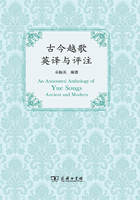
Comments and Annotations
The present song is cited from the 37th and 38th pages of History of Zhejiang Songs and Ballads by Zhu Qiufeng. It is an excerpt from Zhao Ye’s Annals of the States of Wu and Yue (《吴越春秋》). According to the book, Wu Zixu (伍子胥, 559-484 BC) fled to the State of Zheng with the crowned prince Jian (太子建) of Chu in order to prevent the persecution of the king of Chu. The State of Zheng killed the crowned prince, and Wu ran away, with soldiers chasing behind. When he got to a river, Wu requested that the fisherman send him across, which the fisherman fulfilled. Seeing that Wu was hunger-stricken, the fisherman went to get him some food. Suspecting that the fisherman might inform against him, Wu hid behind the reeds. The fisherman returned to find Wu out of sight, and so sang the song to call him out. When they got to the other bank, Wu offered his valuable sword, but the fisherman declined; Wu asked for his name, but he kept silent. Later Wu Zixu became the state’s chief chancellor. He was known as a renowned strategist. The present song expresses the fisherman’s worry for Wu and reflects the fisherman’s devotion to the man he loves regardless of his own risk.
It is not without reason to regard the present song as one of Yue. In his History of Zhejiang Songs and Ballads, Zhu Qiufeng argues that the present song may be regarded as one of Chu as well as one of Wu and Yue because of the reasons stated on the book’s 38th page. For information about the ground for its entry, please refer to Appendix I: Inquiries and Discussions, No. 3.
My findings might also support Qiu’s argument. On a visit to Jiande (建德) of Zhejiang (October 2015), I came to the Ferry of Xu (胥口), which is said to be the place where Wu had been sent across the Fuchun River (富春江). At the ferry stands the Monument of Xujiang Ferry (胥江野渡碑), which tells of the story of Wu Zixu. In commemoration of Wu’s adventure, the local people have given a nearby mountain the name of Mount Xu (胥岭), and the part of the river in question the name of the Xu Rill (胥溪). Besides, the village Qiantan (乾潭), by which Wu is said to have passed, had once been called the Village of Xu (胥村).